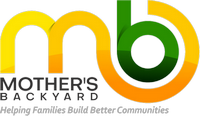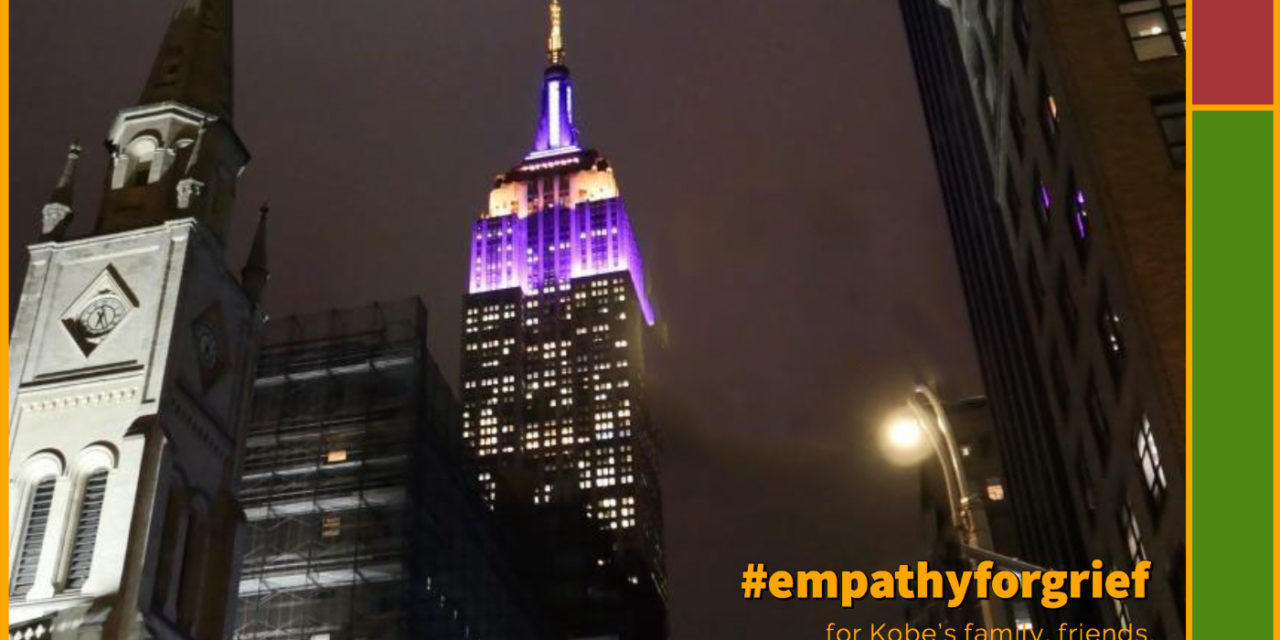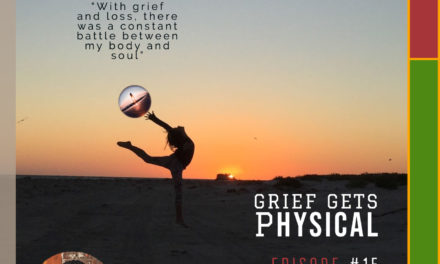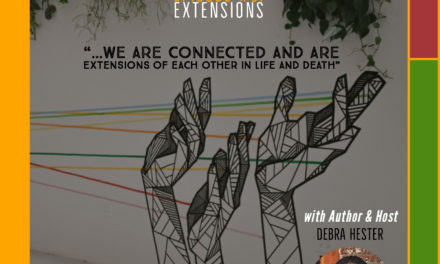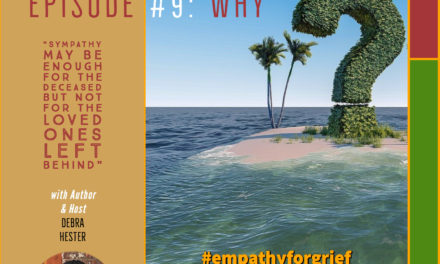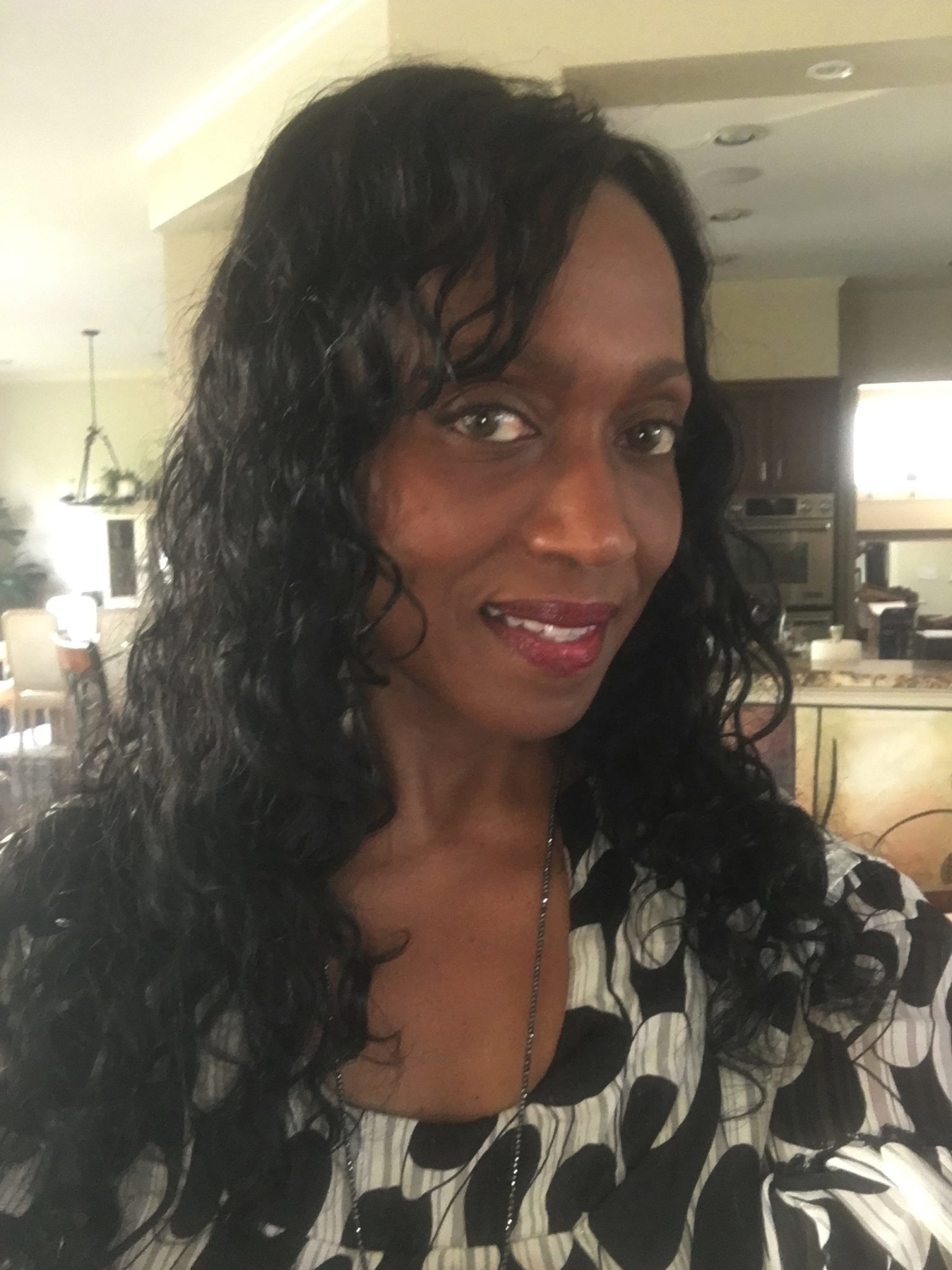Beginning with “That Moment”
Welcome to Mother’s Backyard Buzz and #empathyforgrief episode #11, where I want to focus on “That Moment.” If you’re new, each topic is all about “breaking the silent struggle” around grief. I use my personal grief journey from my book: My Backyard Garden – A Memoir of How Love Conquers Grief and share additional insights into a journey we all will take called grief. Each week, I invite you to join me, Debra Hester, as the author and your host of #empathyforgrief podcast. So let’s start with how I began my grief journey as I reflect and share this week’s topic: “That Moment.”
Lessons Learned From Opening Lines
Chapter 1 of my book is called: “A Change of Planes.” In preparing to write this grief support memoir, I knew I had to find the start. I also knew the opening line of any book is essential. At the time, I didn’t understand how important it is to the literary world or the importance of capturing the reader’s attention. Now, I realize that the opening line is paramount, so if you don’t think it’s up to par bear with me in this memoir. It was the beginning of my writing journey. I promise to do better in my next book.
When I decided to share my grief story based on my experience, it took some time for me to reflect and understand where did my grief journey begin. How did I do it? Well, reflecting wasn’t easy, but it is worth it. At the time I wrote the book, reflecting was like digging myself from underneath a lot of sand or dirt that was covering the person I thought I was. It was as if I was looking back after running from something horrifying in a dream. I know I had gone through something for sure and felt safer but what did I just go through was the lingering question in my mind. And the next issue was where did all this really begin? What was the moment, “that moment” that started me running like this and feeling this way?
In my mind, I hit the rewind button. That allowed me to review my mental footage over and over again. I was trying to figure out where did this grief really start? For Chapter 1 of the memoir, the question had to be: “Where should I start my story?” This is a good question, regardless. Where did my grief really start? It applies if you’re journaling during your grief journey for personal reasons. It also applies if you’re just trying to understand what you’re going through, I ask you to think about what was “that moment” for you? You also might consider the value you might gain in reflecting on “that moment” in your life.
Pondering “That Moment”
If you’re still pondering, “what moment?” Let me say more about how to explore and reflect on “that moment.” Reflect on the exact moment when you started on your grief journey. I found value in trying to pin down that time, that place, that thought to a precise moment. It uncovered a new meaning for my life and my journey. It helped me not only look at myself but my loved one and others around me. For me, reflection sort of puts a scene or situation in slow motion, where you can focus and refocus on different things that may bring clarity and meaning to your journey.
You may already know what “that moment” is depending on how recent it was and how reflective you have allowed yourself to be. If your grief is from long ago, it may not be as readily available to you. My first father was killed in an accident when I was a child and very recently, I experienced myself at his funeral in a dream. I woke up crying, crying in a way that I couldn’t at his funeral. Crying wasn’t easy, but I realized that it was good and needed. All these years, those emotions were buried inside because that’s how I was raised. Just close the chapter, and I did close the chapter; however, I hadn’t resolved the pain from the trauma. For me, crying over that moment some decades later was freeing.
So here’s another question
Do you need to dig that moment up? As always, it is your decision; but unless you feel resolved in your past, you might want to consider remembering that moment again. That moment when you started on your grief journey.
Well, if you listened to Podcast # 10, you’ll know that I always give you a preview to my next podcast. I knew I was going to write about “that moment” for some time. That moment when I knew that my mother was going to die. Even though at that moment, when I knew my mother was going to die, I couldn’t admit it to myself. Why? Simple because it was something that I didn’t want to happen. I had plans for me and my mother. She wasn’t supposed to die before we had more trips together and birthday events, we had more life to live.
Kobe Bryant’s Death Was a Reminder
Here’s another thing. I’ve been hesitant about writing and completing this episode topic for weeks. Hearing about Kobe Bryant, the legendary, professional basketball player, his daughter and the people who lost their lives in that helicopter accident in L.A., created a “that moment” experience for me. I can move forward because of the podcast artwork I chose for this episode. An associate shared a photo he took on LinkedIn, paying tribute to Kobe’s tragedy, and I thought Kobe’s Empire State Building tribute is a visual reminder. Maybe the visual would help people remember how that moment feels. Hopefully, it would remind them to have #empathyforgrief for themselves and others.
Another reason is that I felt “that moment” real-time again, along with the rest of the world. That moment is when you can’t believe what you’re hearing, seeing, or know to be true. It seems unreal, you’re speechless, you’re confused, and your mind and spirit want to reject the news; but it can’t because it’s true. For me, it’s not shocking yet, “that moment” comes before the shock. That moment is a second, maybe longer where I reject reality. Then when I accept the truth, I’m shocked and saddened by the news.
While my mother’s death was not as instant as Kobe’s, the moment I heard about the helicopter accident, helped me realize how there is rejection before the shock. The news of his death prompted me to hope for something different than what I knew was the inevitable. Maybe the family’s of the helicopter crash felt the same way too when they heard the news. When I heard of that moment with my first father’s car accident, I thought I was living a dream for about a year. I’d wake up most mornings, hoping that his accident was just a dream, and he would be coming home that day.
Reflecting on the Impact of “That Moment”
I hope it’s clear what I mean by “that moment,” so we can consider and discuss how reflecting on that moment may bring value to the grief journey. Let’s reflect on that moment when you knew that your loved one was going to die, but you hoped for something different.
First of all, when that moment involves others, and it usually does, it becomes complicated. Why does it become complicated? Because now I realize that each family member came to their moment at different times. In my mother’s case, I mean that moment that she was going to die or she had died. Some people may describe it as letting go. In hospice, they told us that sometimes people hang on and not die because their loved ones don’t want them to go, and the person who is dying can sense that. I tell you, it took all I had not to scream, cry and plead with my mother to hold on. I didn’t want her to die and leave me. But I didn’t do that, and for some months later, I was torn between wishing I had, feeling guilty that I wanted to be selfish
Often people realize how sudden, tragic deaths affect people because “that moment” is in what seems like an instant, but we remember for a lifetime. Like, John F. Kennedy Jr.’s airplane accident where he, his wife, and his sister-in-law were killed. 911, or Kobe’s death and other unbelievable tragic situations, we will always remember those moments. We will not forget where we were or who we were with. But what do you do after that moment? What should you do? I’ve found it helpful to feel what you’re feeling and release your emotions. What I think is the hardest thing to do is realize that everyone is going to respond differently at that moment and after that moment and remember that’s O.K. They may react right away, minutes, hours, days, or even months later. And that’s O.K. In response to that moment, we may cry, pray, say nothing, or get angry.
That Moment on Social Media
Kobe’s death was the first time I was actively on social media during a tragedy that impacted people around the globe. While most people were sad, some didn’t understand why we were grieving on social media over someone we didn’t know personally. I read some of the conflicting posts on the internet about mentioning Kobe and his daughter’s death and not others on the plane. Some asked why people are saying all these positive things about him now. My response was to let people grieve openly by showing their emotions, memories, and photos in a way that works for them. Nothing should be disrespectful to the loved ones left behind. I believe having the social media tools that let us share our feelings like this is good for us as a society. We have hidden our voices around death, dying, and grieving for so long. We no longer have to feel that we are alone, and that is a positive thing.
Some thought it was because he was a celebrity, a famous person. Still, I genuinely believe that a tragedy like that, whether it is a famous person or a plane filled with people we have never met. We know that it is final, it was not their plan, and we are saddened by the unexpected loss of life. We can imagine how their loved ones fill because it could be our loved ones or us. We have #empathyforgrief. So when you remember “that moment,” what I always remind you of still applies, show empathy for yourself and others.
Offering Value
I want to thank you loved ones for listening to #empathyforgrief podcasts episode #10 about “That Moment.” My podcasts are based on the book, My Backyard Garden – A Memoir of How Love Conquers Grief. If you’re joining the weekly podcast, to follow along with the text, you’re not behind. My book is a quick read. It’s meant to capture and share the reality of life and inspire reflection and conversation for those of us who are on this grief journey or know of someone who is. To reflect on “that moment” and look for value in it now. As I continue to reflect and share through my podcasts, I hope that we continue to move and heal.
This is Debra Hester, your host, where I pledge to continue to break the silent struggle with grief. Remember: move forward from the pain of your loss with love and more empathy, less sympathy. If you found the podcast helpful, it’s available anytime on iHeart, iTunes, or from your favorite podcast provider. #empathyforgrief podcast is now on the radio with Force 3 F.M. Radio Network and also streaming online at www.force3radio.com at 2pm CST during their all gospel music Sundays.
I invite you to find out more about my mission at www.mothersbackyard.org. Join me next week when we continue with Chapter 1 – A Change of Planes in my book, My Backyard Garden, A Memoir of How Love Conquers Grief. And the buzz will be about “Going through Changes.”
Peace & Blessings.
